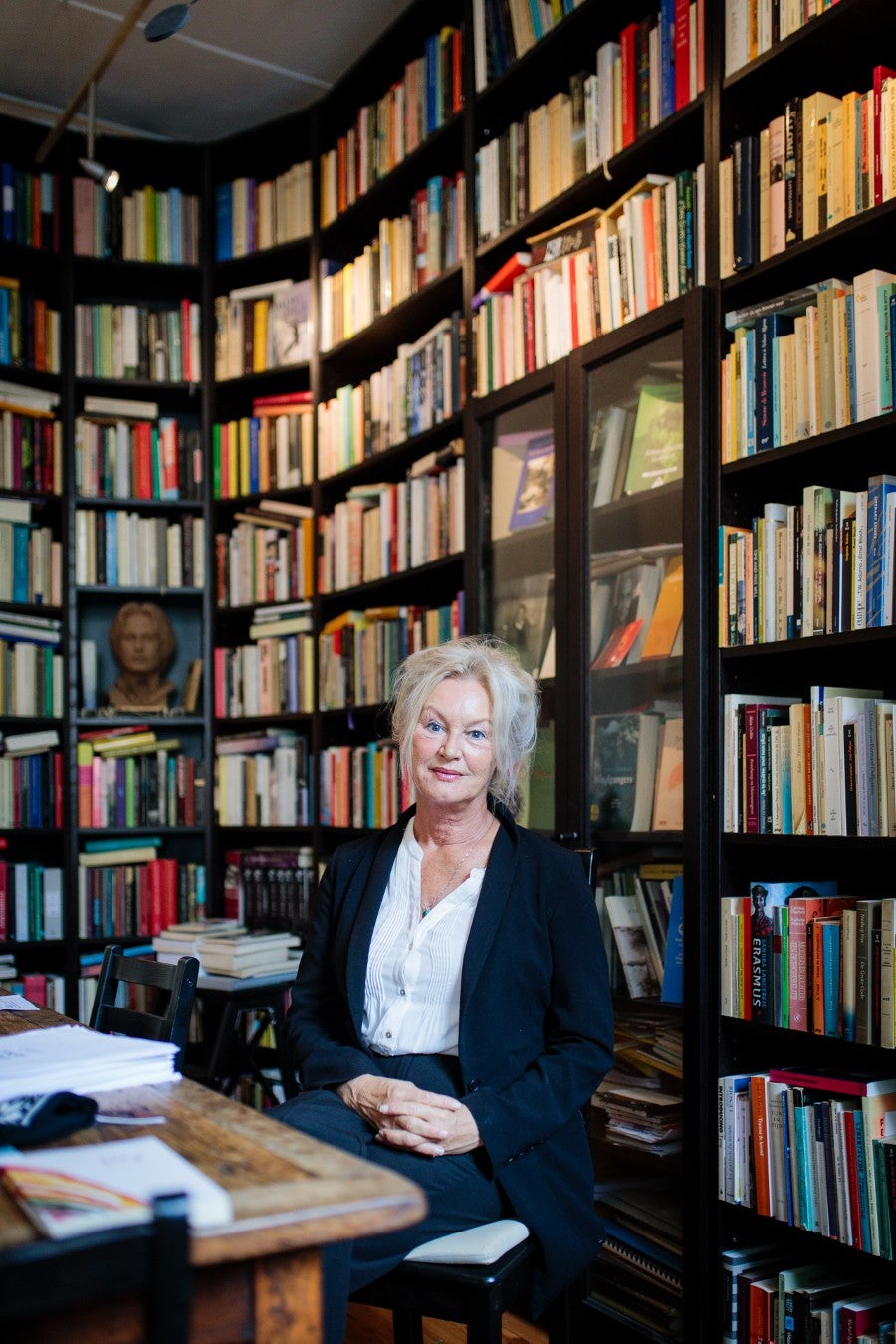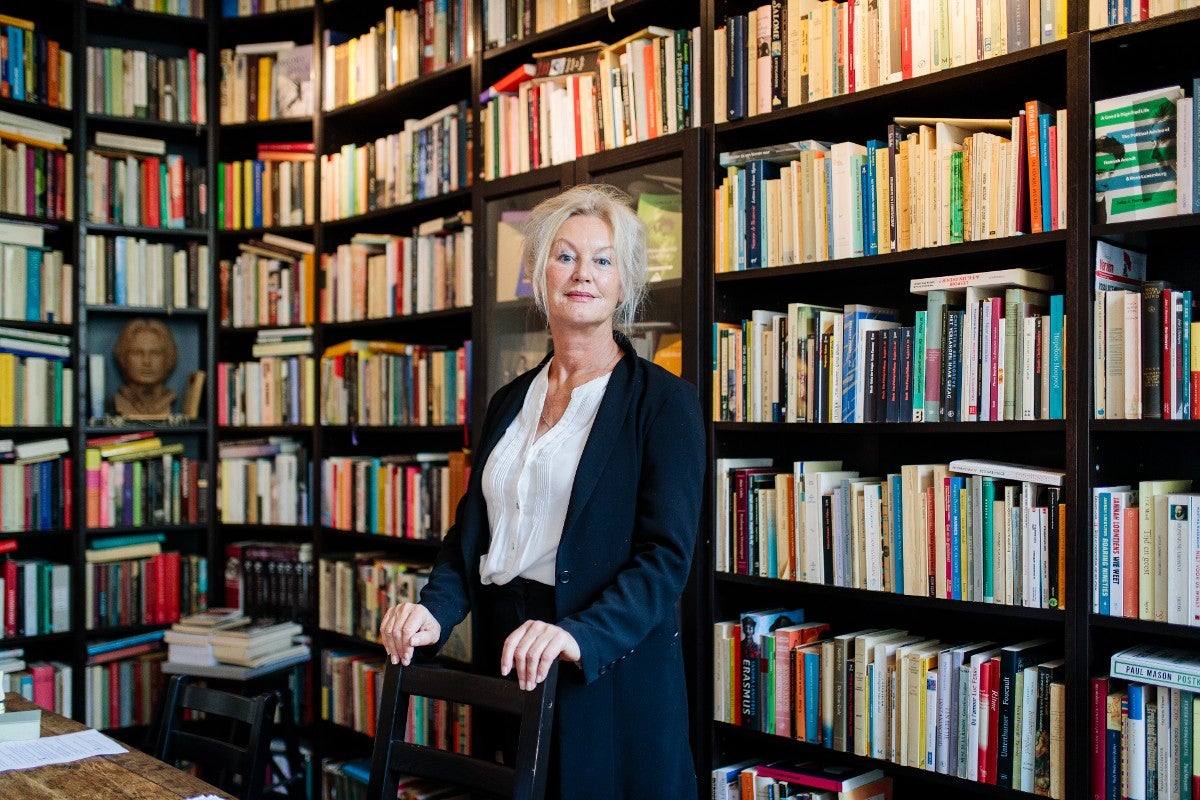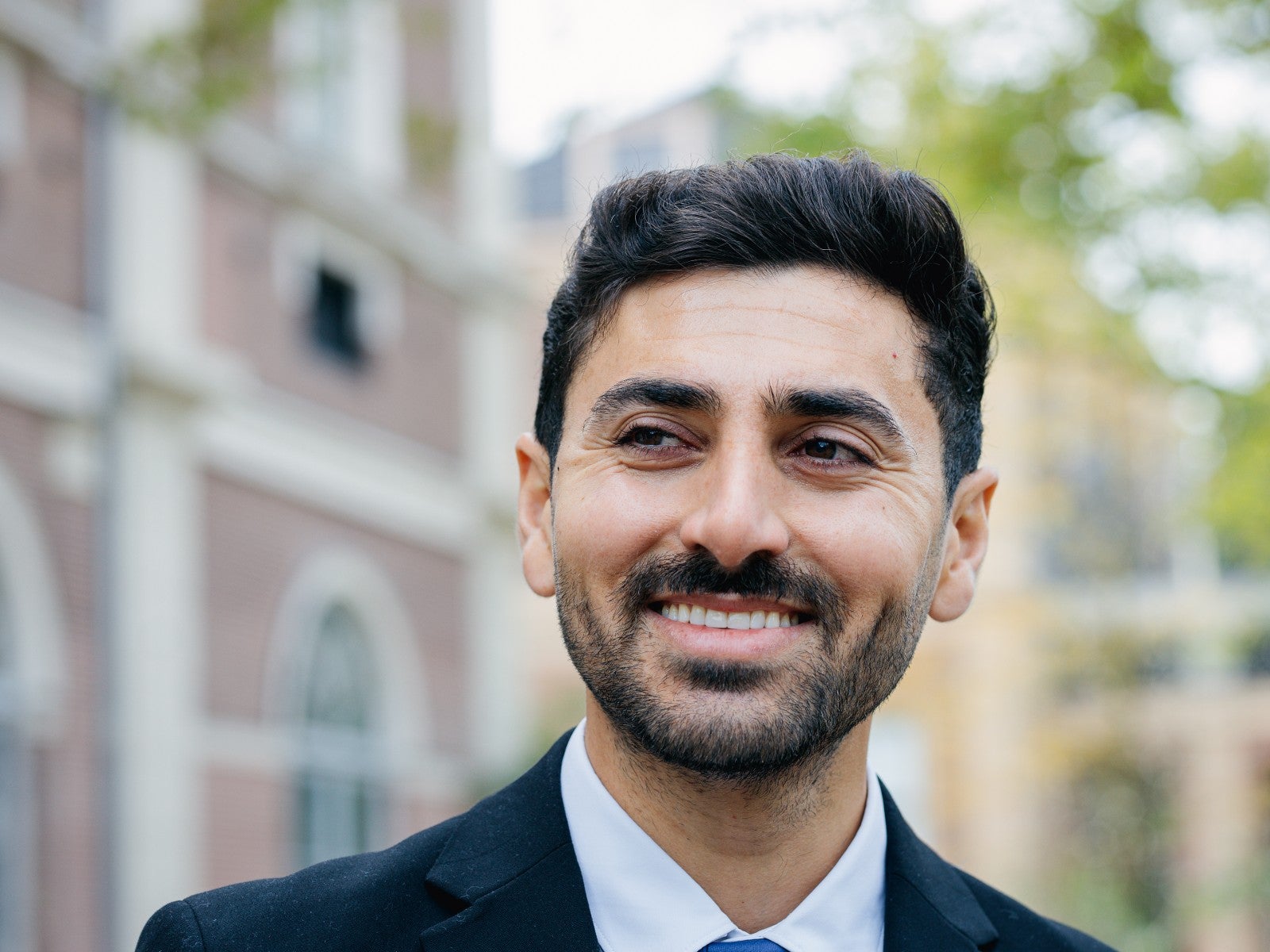For Joke J. Hermsen, studying at Vrije Universiteit Amsterdam felt like being reborn. „I came home to myself.”
In Hermsen's ground-floor apartment in Amsterdam, one's eye is immediately drawn to the extensive bookcase occupying half her flat. The walls adorned with paintings, photos of her children, and amidst it all, a wooden table inviting you for a cup of tea. A place to come home to. Yet Hermsen, for as long as she can remember, has had a tense relationship with 'home'. She explores this in her latest book, Onder een andere hemel (Under a Different Sky).
Your latest book is about homesickness. Do you experience this when it comes to VU Amsterdam?
„I sometimes feel nostalgic for the early years of my studies. For the freedom and wonder that overwhelmed me. I vividly remember entering the main building for the first time, feeling literally overwhelmed by the floors stacked with knowledge. I ascended the stairs, peering into each faculty's library. The thrill of stepping into a world library of knowledge; I still feel that excitement. Soon, I was studying not only French but also philosophy and general literary studies."
Did you feel like you had come home at VU?
„I was the first in my family to go to university. There was no tradition of 'going to VU'. It was a completely new world for me, where I had to figure everything out myself. At times, I felt lost, wandering those long, grey concrete corridors, not knowing anyone. The building itself felt somewhat alienating, not really a place of comfort."
„Walking through a modern suburb, I feel more like I'm my own net."
„Homecoming can happen in many ways, but for me, it's best in places rich in history. I think I also seek shelter in time. For my writing spaces, I always choose 'old' places; I feel more at home there than in new developments. An old cowshed in Drenthe, an old farm in France, even my house in Amsterdam is over a century old. It's as if older places have a different spirit. It's like you can more easily join the flow of time, and the space becomes a net of time. Walking through a modern suburb, I feel more like I'm my own net."
Both positive and negative experiences, then?
„My memories of the first years of my studies are paradoxical. I wasn't happy with the place and the tall, concrete, almost timeless building, but on the other hand, it signified arriving in the world. Moving into my own place meant essentially moving twice. You leave the house you grew up in, but you also move from a protected private world to the public world of lecture halls, theatres, and libraries. It felt like a double move."
„The German philosopher Hannah Arendt describes humans as beings who are reborn each time we start something new. A new study, a new job, a new initiative. She calls this 'natality'. For me, moving to the city and starting university felt like a second birth. Yet, I was often alone during that time. There was no internet or mobile phones. You had to hope to meet someone at a café. That new solitude, however, gave a significant impetus to my writing."
Was becoming a writer inevitable for you?
„I only dared to call myself a writer after four books. It was so unusual in my world: a social environment where people didn't study, where there was little focus on culture, on books. My father, the only one at home who also loved literature, gave me Oeroeg by Hella Haasse when I was about ten, and with it, the entire literary world. From that moment, I always had a book to shelter in and find refuge."

„That's why I regret hearing that children and even students hardly read anymore. Because we also find home in stories, which not only ignite our imagination but also offer a remedy for loneliness. There's much loneliness among students, but immersing yourself in others' stories can bring you closer to people. You become part of a larger whole, a world of voices. Literature can transform our feelings of homesickness and loneliness into connection."
Do you think there's a need for a new concept of 'home'?
„Many people feel uprooted. The threat of the climate crisis, pandemics, and wars raises the question of where we can feel at home in the world. We live in a highly individualized society. Social bonds have been lost, digitalization brings anonymity, families break apart, and there's loneliness among both young and old. In my book, I try to address this feeling of displacement by outlining different forms of finding a home."
You portray homesickness not just as longing for a place, but also as longing for a lost time.
„No matter how our lives have unfolded, we all experience homesickness. We are all migrants from our earliest childhood when we felt united with everything around us. Later, we begin to speak and say 'I', distinguishing things from each other. But that also brings a sense of abandonment and of being 'opposite' the world and others. Throughout our lives, we unconsciously long for that lost time, as Proust wrote in his book (‘A la recherche du temps perdu). It's the source of our homesickness."
„In my book, I examine an unsafe event from my childhood that I had 'forgotten' for half a lifetime."
„We also find home in our memories. It's important to pause at times to reflect on both good and bad memories, to find our way back to ourselves and halt alienation. In my book, I examine an unsafe event from my childhood that I had 'forgotten' for half a lifetime. As distressing as that memory was, only when I confronted it could I provide it shelter, so it no longer pursued me and caused unrest."
Motherhood plays a significant role in your book. You write that you found home in having children.
„Writing and motherhood are both ways of finding home for me, but they also conflict with each other. You're constantly falling short somewhere. Yet, they inspire each other. They both challenge the ego, pushing it aside, allowing more room for connection. They share a vulnerability, unlocking a receptiveness for the miraculous and the irrational. In my book, I refer to this, with Rilke, as the 'world inner space' of the soul. It's also a place to come home to, though it's little valued in a neoliberal society focused on individual success."
Does the soul receive too little attention, in your opinion?
„Since the Enlightenment, the soul has also been neglected in philosophy. I believe we need to breathe new life into the soul in the secular world. The soul is something very different from the intellect: it's where you're deeply touched and find home. The soul tells you who you are, not what you are or what you have. My soul is moved by music, art, stories, encounters with others, and by my children. So, these are the places where my homesickness is quenched."
„Our consumer society places too much value on possessions, often neglecting our 'inner' household."
Is living according to the soul a recipe for a good life?
„According to the classical Greek philosophers, yes. They considered caring for the soul to be humanity's most important task. They called it 'eudaimonia': the pursuit of a good and worthy soul. It's not a solution, but rather a suggestion that we should focus more on this. You can't find a home in a purely material exterior. Our consumer society places too much value on possessions, often neglecting our 'inner' household. Our soul suffers from this, leading to psychological consequences. Only by caring for our own soul, Plato believed, can we also care for others'."
„Terms like soul, inspiration, wonder, emotion, and receptivity have become obscured in neoliberal discourse. My role as a writer is to bring them back to the surface. Because I believe they make us feel less uprooted and also humanize the world."
How do we practically listen to our soul?
„Rest, practicing attention, inner reflection, allowing oneself to daydream, and being inspired by others. When we listen to music, have a meaningful conversation, or read a book, we not only fill time, but can also find home in our soul. We reconnect on a soul level with others. It's hard to envision a better home than this personal, soulful connection.”








